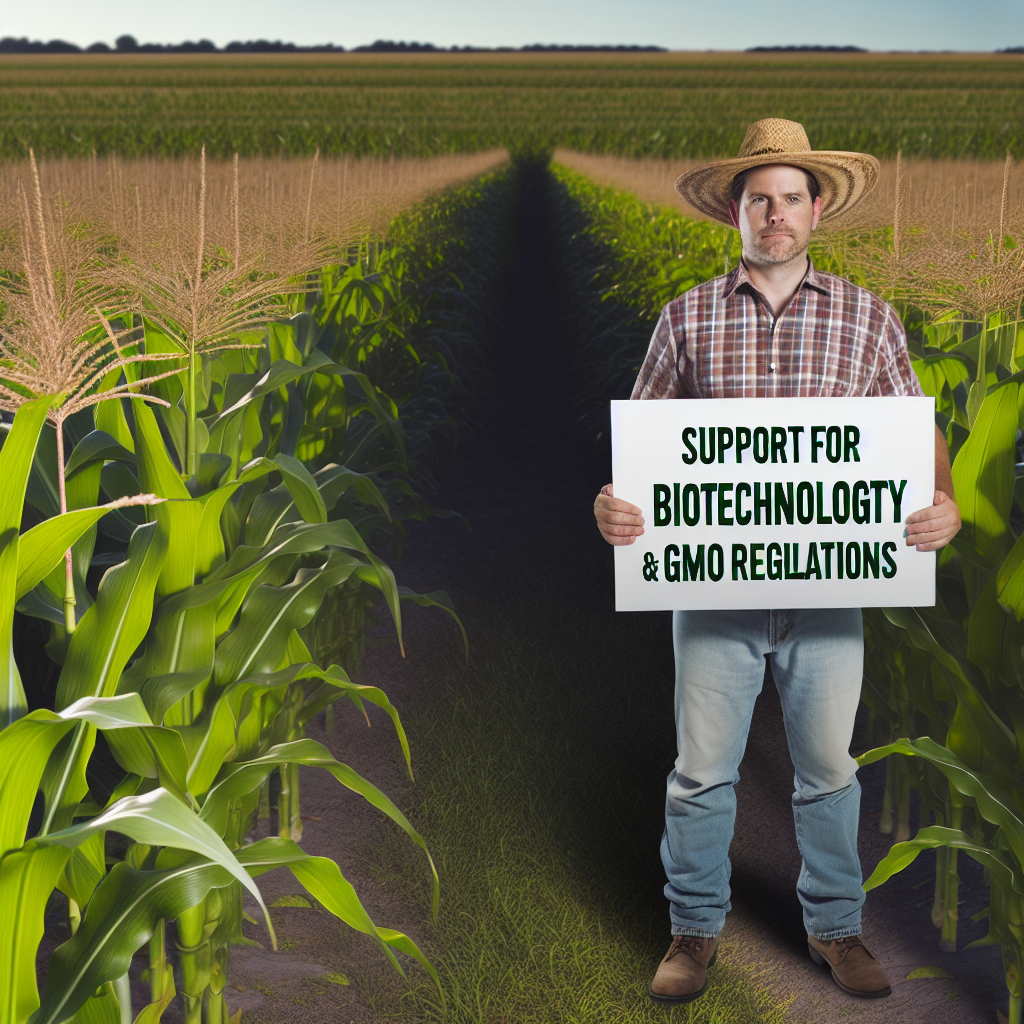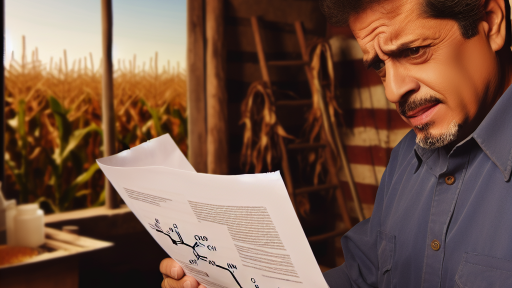Introduction to Biotechnology in Agriculture
Biotechnology refers to a range of techniques used to modify living organisms.
This includes genetic modification, which allows scientists to alter a plant’s DNA directly.
Through these advancements, farmers can grow crops that resist pests and diseases.
Moreover, these crops can tolerate harsh environmental conditions.
By using biotechnology, farmers can enhance crop yields significantly.
In addition, this approach reduces the need for chemical pesticides.
This leads to safer food products and a healthier environment.
The Role of GMOs in Agriculture
Genetically modified organisms (GMOs) play a crucial role in modern agriculture.
They provide solutions to challenges faced by farmers today.
These include increased resistance to pests and improved nutritional content.
As a result, GMOs can effectively reduce crop losses.
Furthermore, they can contribute to sustainable farming practices.
Benefits of Biotechnology
Biotechnology offers numerous benefits for agriculture.
- Higher crop yields support food security.
- Reduced dependency on chemical inputs lowers farming costs.
- Improved crop resilience leads to less environmental stress.
- Biotechnology fosters innovation in agricultural practices.
Regulatory Framework for GMOs
The regulation of GMOs varies by country.
In the United States, the USDA, EPA, and FDA each play a role.
Transform Your Agribusiness
Unlock your farm's potential with expert advice tailored to your needs. Get actionable steps that drive real results.
Get StartedThis ensures that GMOs are safe for both health and the environment.
Likewise, many countries require rigorous testing before approval.
Such regulations help maintain public trust in biotechnology.
Overview of GMOs and Their Development Process
Understanding GMOs
Genetically Modified Organisms (GMOs) are organisms whose genetic material has been altered.
This alteration typically occurs through biotechnology techniques.
GMOs can include plants, animals, and microorganisms.
Farmers often use them to enhance crop productivity.
Additionally, GMOs can improve resistance to pests and diseases.
They may also tolerate harsh environmental conditions.
The Development Process of GMOs
The development of GMOs involves several stages.
First, scientists identify a desired trait to enhance.
Next, they isolate the gene responsible for that trait.
Then, they introduce this gene into the target organism.
This process often employs tools like CRISPR and Agrobacterium.
Evaluation and Testing
After modification, GMOs undergo rigorous testing.
These tests assess their safety for human consumption.
Moreover, they examine environmental impact and agricultural viability.
Regulatory agencies review this data extensively.
This ensures that GMOs meet safety standards before approval.
Regulatory Framework
Governments establish regulations for GMO development and use.
These regulations vary from country to country.
Typically, they aim to safeguard public health and the environment.
For example, in the United States, the USDA monitors agricultural biotechnology.
Similarly, the EPA assesses environmental impacts.
Showcase Your Farming Business
Publish your professional farming services profile on our blog for a one-time fee of $200 and reach a dedicated audience of farmers and agribusiness owners.
Publish Your ProfileFinally, the FDA oversees food safety associated with GMOs.
Benefits of Biotechnology for Crop Yield Improvement
Enhancing Crop Resistance
Biotechnology allows scientists to develop crops that resist pests and diseases.
This resistance reduces the need for chemical pesticides.
For instance, Bt corn contains a gene that protects it from specific insects.
Farmers report higher yields as a result of reduced crop loss.
Improving Nutritional Value
Biotechnology can enhance the nutritional content of crops.
Golden rice is engineered to contain more vitamin A.
This fortification helps combat vitamin deficiencies in many communities.
Genetically improved vegetables can also provide essential vitamins and minerals.
Adapting to Climate Change
Biotechnology develops crops that can withstand extreme weather conditions.
Drought-resistant varieties can thrive in arid regions.
This adaptation is crucial as climate change increases water scarcity.
Additionally, heat-tolerant crops can maintain yields during high temperatures.
Boosting Crop Yields
Better crop varieties lead to increased agricultural productivity.
Farmers using genetically modified crops often see significant yield improvements.
These crops are engineered for higher efficiency in nutrient uptake.
As a result, they can produce more grain per acre compared to traditional varieties.
Reducing Environmental Impact
Biotechnology reduces the environmental impact of farming.
Crops that require fewer inputs help conserve soil and water resources.
Moreover, they contribute to reduced greenhouse gas emissions.
Reduced chemical usage benefits local ecosystems and biodiversity.
Explore Further: Essential Water Rights Facts for Farmers
Environmental Impact of GMO Crops
Reduction in Pesticide Use
Genetically modified organisms (GMO) crops often require fewer pesticide applications.
This reduction leads to lower chemical runoff into water systems.
Consequently, local ecosystems experience less toxicity.
Farmers can also save on pesticide costs, enhancing profitability.
Soil Health Improvements
GMO crops can help improve soil health over time.
These crops often promote reduced tillage practices.
As a result, soil structure remains intact and less erosion occurs.
Moreover, enhanced soil health fosters greater biodiversity among microorganisms.
Carbon Footprint Reduction
Biotechnology can play a vital role in reducing carbon emissions.
GMO crops generally require less fuel for cultivation and harvesting.
This lowers the overall carbon footprint of agricultural operations.
Additionally, some GMO crops are developed to sequester more carbon in the soil.
Biodiversity Considerations
The introduction of GMO crops has spurred discussions on biodiversity.
While concerns exist, evidence shows that these crops can coexist with non-GMO varieties.
Many farmers adopt strategies that encourage pollinator populations, such as planting flower strips.
These practices enhance overall ecosystems while growing GMO crops.
Risk Management and Resistance
Implementing GMO crops can mitigate risks associated with pests and diseases.
Resistance management strategies are critical in avoiding pest outbreaks.
Showcase Your Farming Business
Publish your professional farming services profile on our blog for a one-time fee of $200 and reach a dedicated audience of farmers and agribusiness owners.
Publish Your ProfileAdditionally, farmers can implement crop rotation and integrated pest management.
These approaches contribute to a balanced agricultural system while optimizing yield.
Delve into the Subject: Key Zoning Considerations for Farm Expansion
Economic Advantages of Using Biotech Seeds
Increased Crop Yields
Biotech seeds significantly boost crop yields.
This increase often leads to higher overall production.
Farmers can produce more food on the same amount of land.
As a result, they meet growing food demands effectively.
Reduced Costs
Using biotech seeds often reduces farming costs.
Farmers spend less on pesticides due to pest-resistant crops.
This reduction can save thousands annually.
Additionally, fewer applications mean lower labor costs.
Better Resource Management
Biotech crops enhance resource efficiency in farming.
They often require less water than conventional crops.
This efficiency helps sustain local water supplies.
Furthermore, farmers can reduce their carbon footprint.
Stronger Resistance to Disease
Biotech seeds improve resistance to various diseases.
This advancement helps reduce crop losses significantly.
Farmers can safeguard their investments more effectively.
Consequently, they achieve a steadier income flow.
Market Access and Competitiveness
The adoption of biotech seeds enhances market access.
Farmers gain a competitive edge with higher-quality products.
They can penetrate global markets more easily.
This access opens new revenue opportunities for them.
Innovation and Research Opportunities
Investing in biotechnology fosters innovation in agriculture.
Farmers benefit from ongoing research and development.
New technologies often lead to better crop varieties.
These developments ensure long-term sustainability and growth.
Delve into the Subject: Managing Farm Water Use Effectively and Legally

Understanding GMO Regulations at National and International Levels
Overview of GMO Regulations
GMO regulations govern the development and use of genetically modified organisms in agriculture.
These regulations vary between countries and regions.
They aim to ensure food safety and environmental protection.
Moreover, regulations help facilitate international trade.
National Regulations
Countries create their own frameworks for GMO regulation.
In the United States, the Agricultural Biotechnology Subcommittee oversees GMO policies.
It assesses bioengineered plants before they enter the market.
The Food and Drug Administration also plays a crucial role in safety evaluations.
Key Agencies Involved
- United States Department of Agriculture (USDA)
- Environmental Protection Agency (EPA)
- Food and Drug Administration (FDA)
International Regulations
On the international stage, regulations can differ widely.
The Codex Alimentarius Commission offers guidelines for food safety.
Additionally, the Cartagena Protocol aims to protect biodiversity from GMOs.
Trade Agreements and GMOs
Trade agreements often stipulate GMO labeling and safety standards.
Showcase Your Farming Business
Publish your professional farming services profile on our blog for a one-time fee of $200 and reach a dedicated audience of farmers and agribusiness owners.
Publish Your ProfileCountries that import crops may have stricter regulatory processes.
Thus, this affects how farmers and businesses operate globally.
Public Perception and Policy Development
Public sentiment plays an important role in shaping GMO regulations.
Concerns about health and environmental impacts influence policy decisions.
Ongoing research and transparency are vital for building trust.
Engaging Stakeholders
- Farmers
- Consumers
- Environmental groups
Engaging these stakeholders fosters better policy outcomes.
Balanced public discussions can lead to informed regulations.
You Might Also Like: Sustainable Farming Practices Under New Laws
Public Perception and Awareness of Biotechnology in Agriculture
Understanding Public Attitudes
Public perception of biotechnology in agriculture varies widely.
Some individuals embrace it for its potential benefits.
Others express skepticism about its safety and impact.
This division often stems from varying levels of knowledge.
Education plays a crucial role in shaping these attitudes.
The Role of Media and Communication
The media significantly influences public opinion on biotechnology.
Positive stories can enhance awareness and acceptance.
Conversely, negative reports can lead to fear and misinformation.
Transparent communication from scientists is essential.
Public discussions about GMO safety should be factual and clear.
Influence of Personal Experiences
Personal experiences shape individuals’ views on biotechnology.
Those with a farming background may view it more favorably.
Consumers who observe benefits in their food supply may agree.
However, negative encounters can lead to distrust.
Every experience contributes to the overall narrative about GMOs.
Educational Initiatives
Education initiatives can bridge the knowledge gap.
Schools and communities play a vital role in spreading awareness.
Workshops and seminars can inform the public about biotechnology.
Interactive programs make learning engaging and accessible.
Informative resources can demystify the science behind GMOs.
Stakeholder Perspectives
Farmers, consumers, and scientists offer diverse insights.
Farmers often highlight the increased yield and crop resilience.
Consumers may focus on safety and labeling of GMOs.
Meanwhile, scientists advocate for evidence-based discussions.
Collaboration among stakeholders is crucial for understanding.
Global Trends
Views on biotechnology also differ globally.
Developed countries tend to have more acceptance than developing ones.
Regulatory frameworks also influence public perceptions.
As global food demands rise, awareness will need to expand.
Cultivating a global understanding of biotech in farming is necessary.
Future Trends in Biotech Crop Development and Regulatory Changes
Advancements in Genetic Engineering
Genetic engineering continues to evolve rapidly.
Researchers are developing crops with improved traits.
Showcase Your Farming Business
Publish your professional farming services profile on our blog for a one-time fee of $200 and reach a dedicated audience of farmers and agribusiness owners.
Publish Your ProfileThese traits include enhanced pest resistance and drought tolerance.
As a result, farmers can achieve higher yields sustainably.
Moreover, innovations in gene editing technologies are emerging.
Techniques such as CRISPR are becoming more mainstream.
This approach allows for precise modifications in crops.
Increased Focus on Sustainable Practices
There is a growing emphasis on sustainable farming practices.
Biotech crops contribute by reducing chemical inputs.
These crops can be engineered for lower herbicide use.
Additionally, they may help diminish reliance on pesticides.
Consequently, sustainability becomes a key selling point.
Shifts in Regulatory Frameworks
Regulatory bodies are adapting to new biotechnologies.
As innovations advance, regulations are being reassessed.
Some countries are moving toward more lenient policies.
This shift promotes quicker approvals for beneficial GMOs.
Stakeholders are advocating for balanced oversight.
They seek to ensure safety without stifling innovation.
Global Trade Implications
Biotech crops are influencing global trade patterns.
Countries that embrace these technologies gain competitive advantages.
On the contrary, nations resistant to biotech might fall behind.
Trade agreements are beginning to reflect these realities.
Consequently, how countries regulate GMOs can affect trade relations.
Consumer Acceptance and Education
Consumer perceptions of GMOs are evolving.
Education plays a crucial role in shaping public opinion.
Transparency about biotech farming methods is vital.
Furthermore, positive messaging can enhance acceptance.
Producers must focus on informing consumers of benefits.
Future Research Directions
Research in biotech crop development will expand.
Focus areas include nutritional enhancements and climate resilience.
Additionally, scientists are exploring public health benefits.
Overall, ongoing research is essential for future advancements.
Additional Resources
Agricultural Biotechnology: Overview, Regulation, and Selected …




